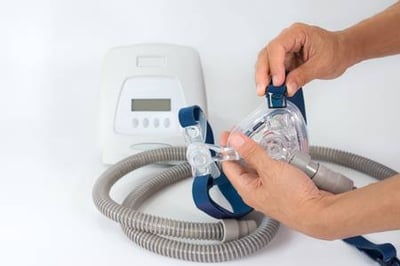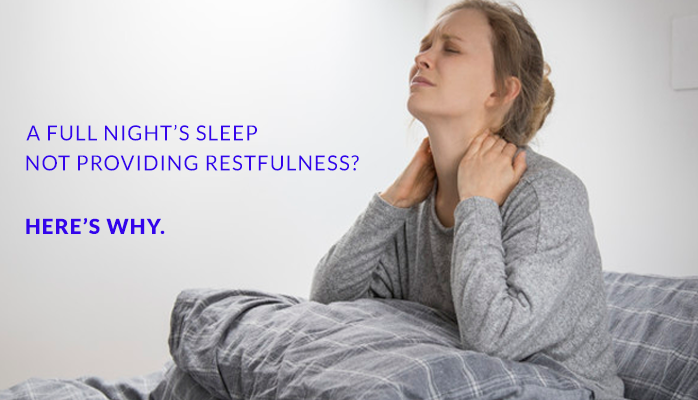When you wake up in the mornings, you should feel rested and full of energy. However, if there are times that you wake up feeling tired, even after 8 hours of sleep, then you may not be getting restful sleep. Closing your eyes and lying in bed is not enough. There are other aspects of sleep that determine the amount of rest that you feel upon waking.
If you wake up feeling like you hardly slept, even if you slept all night, it’s going to impact your life because you'll be tired all the time. When you are tired all the time, you may find that you experience more mood swings, have trouble performing well at work or school, lose motivation to do fun things for yourself, and struggle in your interpersonal relationships. Life is simply more challenging when you have chronic fatigue.
It can be especially frustrating when you feel like you're trying to get enough sleep, and therefore, should be rested and happy. If you struggle with chronic fatigue, even after getting adequate sleep, some factors that may influence that are:
- Bad habits and/or cognitive conditions
- Sleep disorders
- Bad sleeping environment
- Medical problem
Let’s look at these in more detail.
Common Medical Causes of Fatigue
There are some medical conditions that commonly cause fatigue, even though you are getting 8 or more hours of sleep:
- Hypothyroidism
- Hormone problems
- Diabetes
- Anemia
- Heart Disease
- Chronic illness
These conditions can cause fluctuating sleep cycles ranging from complete restlessness to oversleeping. If you noticed strange sleeping patterns along with other physical symptoms, like being cold or hot all the time, increased thirst, increased urination, swelling of the lower legs, and weight fluctuations, then you may want to considering visiting your primary care physician for evaluation.
Sleep Conditions That Cause Fatigue
One of the more common reasons you may be tired all the time is because of a sleeping disorder. Sleep disorders are conditions that prevent you from getting quality sleep. Here are a few sleeping disorders that decrease your sleep quality, causing chronic fatigue no matter how long you are in bed sleeping.
 Sleep apnea is a sleep disorder and medical condition that causes you to repeatedly stop breathing throughout the night, anywhere from 40 to 100 times per night, and subconsciously wake up to resume breathing. Therefore, you might sleep 8 hours and still feel like you barely slept because you didn't! It causes severe sleep deprivation and the following symptoms:
Sleep apnea is a sleep disorder and medical condition that causes you to repeatedly stop breathing throughout the night, anywhere from 40 to 100 times per night, and subconsciously wake up to resume breathing. Therefore, you might sleep 8 hours and still feel like you barely slept because you didn't! It causes severe sleep deprivation and the following symptoms:
- Bed partner hears you repeatedly stop breathing throughout night
- Loud, chronic snoring
- Wake up exhausted in the morning
- Wake up with headaches
- Waking up choking/gasping
- Mood disruptions, such as constant irritability, brain fog, etc.
Fortunately, sleep apnea is usually treated 100% with CPAP therapy as shown in the picture above.
Another set of sleep disorders that will leave you feeling tired after a full night’s sleep are parasomnias. Parasomnias are disruptive sleep disorders that interfere with your circadian rhythm, and may impact sleep quality without your awareness of it. They include the following disorders:
- Restless leg syndrome
- Sleepwalking
- Night terrors
- Chronic nightmares
Lifestyle and Cognitive Causes of Fatigue
There are numerous lifestyle and emotion-related causes of sleep deprivation from the lack of sleep quality, including:
- Drinking too much alcohol, which greatly impacts REM sleep
- Poor diet/malnutrition, such as allergies or intolerances that can make you feel lethargic and sluggish all of the time
- Clinical depression/anxiety
- Post-Traumatic Stress Disorder
- Shift Work
Bad Sleeping Environment Affecting Sleep Quality
Sleep deprivation despite good length of sleeping isn’t always the product of a sleeping disorder. Your sleep quality might also be impacted by:
- Not having an ideal sleeping environment: quiet, dark, peaceful, and comfortable room
- Adjust to doing shift work
- Stress/anxiety from work, marriage/divorce, moving, etc.
- Working hours that do not align with your natural circadian rhythm
- Too much “screen time” with laptops/TV/cell phones before bed, as the blue light can delay the onset of restorative stages of sleep
Throughout this blog post, we have discussed numerous ways in which you can get less quality sleep, even if you are in bed for the right amount of hours. If you are living in Anchorage and struggle with chronic fatigue or daytime tiredness please contact us by clicking the orange button below and taking a free online sleep test.


